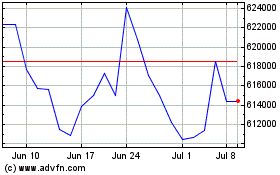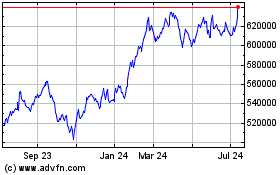Gates Foundation Asks U.S. and Other Nations to Not Give Up on Foreign Aid
February 14 2017 - 1:58PM
Dow Jones News
By Betsy McKay
Bill and Melinda Gates have a message to the U.S. and other
nations that have recently signaled they will prioritize domestic
needs: Don't give up on foreign aid.
The U.S. spends less than 1% of its annual budget on foreign
aid, but the money has saved millions of lives, the co-chairs of
the Bill & Melinda Gates Foundation said in recent interviews
in advance of the release of their widely-read annual letter, which
this year lays out significant progress made in global health over
the past several years.
Helping people live healthier lives in other countries is in
both the U.S.'s and the world's interests, they wrote in an
introduction to this year's annual letter, which is written to
investor Warren Buffett, their close friend, who donated $30.24
billion worth of Berkshire Hathaway Inc. stock to the Gates
Foundation in 2006.
"We have new leadership in the U.S., so we need to engage with
them. We have new leadership in the U.K., so we need to engage with
them," Mr. Gates said in an interview.
While the administration of President Donald Trump has yet to
declare its stance on foreign health aid, Mr. and Mrs. Gates say
they are concerned. "Of course I'm worried," Mr. Gates said. "What
I'm hoping is that it remains enough of a priority that it at least
stays as strong as it is."
The U.S. President's Emergency Plan for AIDS Relief, started by
President George W. Bush in 2003 and known as Pepfar, spends about
$5.2 billion a year currently on AIDS drugs and care for patients
in nearly 60 countries. If funding for that program is cut, "people
will die," Mr. Gates said.
A spokesman for the State Department didn't respond to a request
for comment. Secretary of State Rex Tillerson expressed support for
Pepfar in a Senate confirmation hearing last month.
Wealthy private donors like the Gates Foundation wouldn't be
able to fill the gap should U.S. funding for Pepfar stop, Mr. Gates
said: "Pepfar alone is as big as our entire foundation --
everything we do."
"Philanthropy is just the catalytic wedge -- we can take the
risk, we can take the chances, but philanthropy's money is always
small compared to government money," Mrs. Gates said in an
interview.
The Gates's annual letter is widely read in global development
circles. The couple said they wrote it to Mr. Buffett because he
had asked them to reflect on the past decade of their foundation's
work.
Investments by the Gates Foundation, governments and others have
driven vast improvements, they wrote. Since 1990, the lives of 122
million children under age 5 have been saved by vaccination and
better health care, they wrote.
"The world is a better place to live than it has ever been," Mr.
Gates wrote in the letter. "Global poverty is going down, childhood
deaths are dropping, literacy is rising, the status of women and
minorities around the world is improving."
Saving children's lives has economic benefits: Parents can
choose to have fewer children, meaning that they can nurture, feed
and educate each child better, giving them a better chance to rise
out of poverty, they wrote.
Today, 86% of children have received the basic vaccines against
common childhood diseases, they wrote. Every dollar invested in
immunizations delivers $44 in economic benefits, including the
money saved when a parent can't work because a child is sick, they
added.
Still, one million babies died in 2015 on the day they were
born. And while more than 300 million women in developing countries
are using modern contraceptives, there are still at least 225
million more who are asking for them, says Mrs. Gates, for whom
expanding access to family planning is a priority.
Mr. and Mrs. Gates outlined in the letter the programs they're
funding to address these health challenges. They include Family
Planning 2020, a global initiative that the foundation is part of
to make contraception available to 120 million more women by
2020.
Write to Betsy McKay at betsy.mckay@wsj.com
(END) Dow Jones Newswires
February 14, 2017 13:43 ET (18:43 GMT)
Copyright (c) 2017 Dow Jones & Company, Inc.
Berkshire Hathaway (NYSE:BRK.A)
Historical Stock Chart
From Aug 2024 to Sep 2024

Berkshire Hathaway (NYSE:BRK.A)
Historical Stock Chart
From Sep 2023 to Sep 2024
